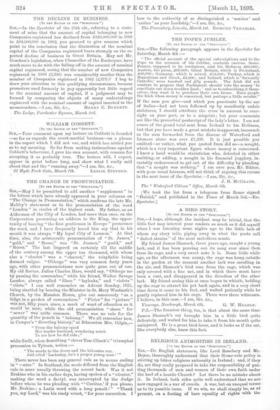THE CHANGE IN PRONUNCIATION.
70 THE EDITOR OF THE " SPEOTATOR."3
SIR,—May I be permitted to add another "supplement" to the letters which have already appeared in your columns on "The Change in Pronunciation," which confirms the late Mr. Maltby's statement as to the pronunciation of the word "London " in circles of the highest rank, My father, as an Alderman of the City of London, had more than once, on the Corporation presenting an address to the King, the oppor- tunity of hearing "the first gentleman in Europe" pronounce the word, and I have frequently heard him say that in his mouth it was always "My loyal City of Lannon." At that time, also, the aristocratic pronunciation of "St. James," "gold," and "Rome," was "St. Jeames," " goold," and "Room." The last lingered on certainly till the middle of the century among the upper ten thousand, with whom also a " chariot " was a " charret," the trisyllable being deemed vulgar. " Obleege " was very common forty years ago, with other pronunciations now quite gone out of use. My old Rector, Julius Charles Hare, would say, " Obleege me by passing the coweumber," while his friend, Walter Savage Landor, always called " lilacs " " laylocke," and " violets " " vilets." I can well remember on Advent Sunday, 1825, being startled by hearing the Minister in S. Mary Woolnoth's Church, by the Mansion House, give out sonorously "as a lodge in a garden of cowcumbers." " Pieter " for " picture " was not, fifty years since, a mark of want of education as it would be now; while the old pronunciation " shore " for " sewer " was quite common. There was no rule for the quantity of the penult in "balcony." We all remember how, in Cowper's "diverting history," at Edmonton Mrs. Gilpin,— " From the balcony spied
Her tender husband, wondering much To see how he did ride ;"
while Swift, when describing "clever Tom Clinch's" triumphal procession to Tyburn, writes :— " The maids to the doors and the balconies ran, And cried Lackaday, he's a proper young man!"
There never has been any general rule as to nouns ending " —ator." In Scotland, the mode differed from the English rule in more usually throwing the accent back. Was it not Erskine who in his earlier days, having spoken of a " cdrator," making the word a dactyl, was interrupted by the Judge before whom he was pleading with Curator,' if you please, Mr. Erskine; a Latin word with a long penult!" "Thank you, my Lord," was his ready retort, "for your correction. I bow to the authority of so distinguished a 'senator' and orator ' as your Lordship,"—I am, Sir, &c., The Precentory, Lincoln, March 1st. EDMUND VENABLE&


































 Previous page
Previous page